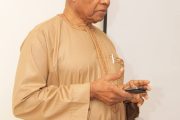Back to ‘Dollars and Virtues’ in the Demise of WIN
“An apocryphal episode occurred during my visit to Chile. A director of a research centre invited his mother from the provinces to visit him in Santiago. He drove to the airport in his new Peugeot to pick her up. “Where did you get this beautiful car”, she exclaimed as she observed all the gadgets on the dashboard. “The institute financed it. I need it for my research to overthrow the dictatorship”, he answered. When they arrived at the suburban home, the mother gazed with wonder.”Where did you get this beautiful house?” “The institute financed it. I need it for my research to overthrow the dictatorship”. They entered the dining room, where dinner was waiting: a table covered with shellfish, fowl, salads, fruits and wine. Eating heartily, she asked, “Where did you get such an elaborate meal?” “The institute financed it. I need it for my research to overthrow the dictatorship”. At this point, his mother plucked his ear and whispered, “Be careful they don’t overthrow the dictator and you lose everything”.
A Facebook group made up of retired Nigerian activists has been at war with itself for the better part of the week. They are locked in a ‘debate’ on who and what killed Women In Nigeria, (WIN), the feminist platform floated within the politics of National Democratic Revolution in Nigeria in the 1980s. Some said WIN died from the fissure over men membership of a feminist organisation. Others said it was from Chom Bagu’s problematic of “Dollars and Virtues” in the politics of radical civil society activism in Nigeria. It has been a very amusing debate, especially from those who see it from the first position. It will always amuse that men’s active presence in WIN could become an issue given that WIN was distinguished by its definition of the Woman Question in terms of the “liberation of the oppressed and poor majority of the people of Nigeria” Within that theoretical, ideological and organisation raison d’être of WIN, anyone objecting to membership and active participation of men in WIN had either ideologically missed her way into the organisation or was on a mischief mission, a hidden agenda. This is simply because WIN was a deliberate political reading of the Women Question, far, far ahead of the Womenism of the National Council of Women Societies, (NCWS), for instance. Unlike today when the understanding of oppression has been broadened beyond the class dimension to the ethnic, religious, regional, minorities and similar identities, that was not the case in the late 1990s when the squabbles over men membership became a conflict issue.

Hajiya Amina Salihu, Co-author of Feminism or Male Feminism? :The Lives and Times of Women in Nigeria

Cde Mma Odi, a leading voice in the current Facebook shouting match
The second position has, therefore, had attraction in the explanation of the crash. It is amused by the question of how men’s membership fissure arose in the first case in a front organisation that had established such a credible presence just on the strength of the lean financial resource base of students, professionals and very few politicians. So, it argues that though the sentiment evolved, central to it was struggle for power at a time of relatively vast resource flow from funders, donors and development partners.

Dr Eka Williams, a key player in the WIN crisis then
The WIN convulsions coincided with an entertaining as well as an ideologically serious think piece that the Council for the Development of Social Science Research in Africa, (CODESRIA) once published in one of its bulletins in the mid 1990s. It was fairly circulated in Nigeria in those days by activist scholars involved in the CODESRIA space. The altercations within the Facebook group brought to mind the think piece. Unable to locate the think piece as published in the particular CODESRIA Bulletin in the mid 1990s, Intervention took time to extract the same material from the book where Professor Petras, the Latin American Sociologist at the University of Binghamton who authored the piece had included it. The work is titled US Hegemony Under Siege: Class, Politics and Development in Latin America, a 1990 publication jointly edited by Petras and Morris Morley. Within the book, it forms the chapter titled “The Metamorphosis of Latin America’s Intellectuals”. That is the quote published above for whatever it contributes to the debate within the Facebook earlier mentioned, although the book chapter was fundamentally addressing the issue of ‘dollars and virtues’ in relation to intellectuals in Latin America, not the larger civil society and not in Nigeria. But readers would find how applicable it is to Nigeria and Africa, beyond WIN. This is though not to omit what the Nigerian State contributed to the metamorphosis of radical politics in Nigeria in the period in question.
It might be important to note the two paragraphs preceding the quote in the text. It goes as follows: “Today, the institutionalized intellectuals are in a Foucaultian sense prisoners of their own narrow professional desires. …Their links with the external foundations, international bureaucracies and research centres dominate a vacuous and vicarious internal political life. In the past, the organic intellectuals struggled with a self-sustaining, self-financing intellectual existence. They lived and suffered the economic cycles of their countries. Today, the institutional intellectuals live and work in an externally dependent world, sheltered by payments in hard currency and income derived independently of local economic circumstances. The deep internal horizontal linkages between the organic intellectual and civil society contrast with the vertical linkages between the institutional intellectual and the external funding agencies and, with the advent of civilian regimes, with the local state and regimes….This new class has a life – and work – style that contrasts sharply with the preceding generation of organic intellectuals”.
But, does the Dollar impair virtues in civil society activism in all cases and climes? That’s perhaps a subject for another debate by another Facebook group.




























